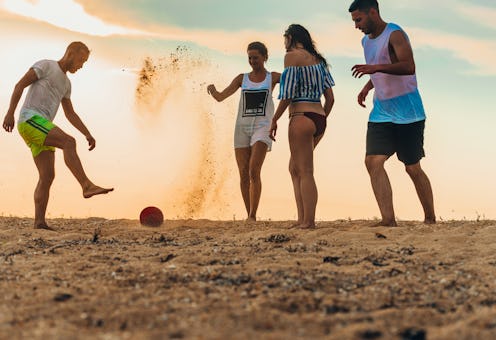Life
Here’s How Joining An Adult Sports League Can Boost Your Mental Health

Participating in team sports as a kid can apparently help improve your mental health into adulthood. According to new research, young people who participated in team sports between middle school and high school have lower odds of receiving a diagnosis of depression or anxiety in early adulthood. So if you never could quite crack those basketball team tryouts — or if you never tried out to begin with, because sports and people are both difficult — don’t despair. You can still find team sports for adults who want to play, socialize, and cultivate every advantage possible against depression.
According to the new study, published in the JAMA Network, team sports improve the mental health of traumatized adolescents. The study tracked the relationship between mental health and team sports in children who experience Adverse Childhood Experiences (ACEs). These experiences included emotional and sexual abuse, emotional neglect, parental incarceration, or parental alcohol misuse. Team sports increased the mental resilience of these young people into adulthood, because levels of anxiety and depression diagnoses were lower in adults who had played team sports as a kid.
So what are you to do if you played team sports as a kid and experience mental health symptoms? Or if you never played team sports to begin with? This study focused on children who had good reason to be out of their house, with team sports offering a way to be far from toxic home environments for at least a few important hours a week. But what if you weren’t allowed to play team sports, or simply didn’t want to?
Avoiding team sports is common, especially for marginalized youth. Racism in youth team sports is pervasive, and a 2017 study published in the Journal of Sport and Health Science found that homophobia and transphobia in youth team sports still actively prevents LGBTQ youth from playing. And then, of course, you might have been one of those kids who just didn’t like team sports. All valid reasons for not playing!
But, if you’re looking to socialize and have some fun instead of enduring the high-pressure environment of youth team sports, there are many adult leagues that are explicitly meant to heal those old wounds. Adult team sports aren’t, of course, automatically structured into adult life in the way that youth sports are structured into school systems. But, proactively seeking out recreational adult leagues can bring online social networking offline, encouraging low-stakes weekly social commitments and fighting loneliness and isolation in adulthood.
According to a 2019 study published by the BMC Public Health journal, it doesn’t even have to be team sports for physical activity to combat isolation and loneliness. The study found that in older adults, reduced physical activity was associated with increased social isolation. And those patterns often start during younger adulthood.
So when you’re thinking about gathering up the courage to poke around your local community for a team sport, there are a few things you should know. First and foremost, you do not have to be an athlete or have a desire to get sweaty in order to join adult recreational leagues! Depending on where you live, there may be options as diverse as basketball and softball all the way to bowling and frolf (which is, apparently, a combination of golf and frisbee).
And — again, depending on where you find yourself in the country — there are often different tiers of intensity you can join. For example, the Varsity Gay League offers bowling, beach volleyball, and even trivia in cities like Austin, Ft. Lauderdale, and Sacramento. And, they often offer Social, Recreational, and Competitive choices so you can choose your level of intensity. In addition, many local community organizations like The Y offer adult recreational sports like basketball, volleyball, and swimming, and many local branches have tiered options for people of various skill levels who want a variety of things from the experience.
Finding a local adult sports league is often as easy as Googling what you’d like to play along with your city. You can also check out your local community center to see what they have going on for adults looking to combat isolation and depression with good old fashioned team spirit. And if you’re not finding anything in your area, there’s nothing saying you can’t create your own adult sports league: your inner child might thank you.
If you or someone you know is seeking help for mental health concerns, visit the National Alliance on Mental Health (NAMI) website, or call 1-800-950-NAMI(6264). For confidential treatment referrals, visit the Substance Abuse and Mental Health Services Administration (SAMHSA) website, or call the National Helpline at 1-800-662-HELP(4357). In an emergency, contact the National Suicide Prevention Lifeline at 1-800-273-TALK(8255) or call 911.
This article was originally published on